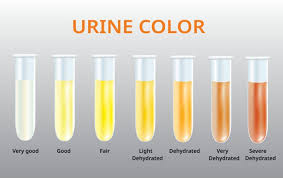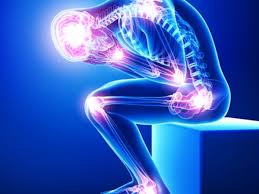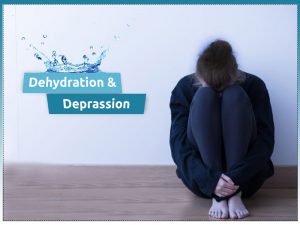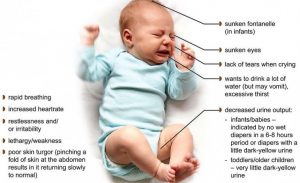How do you know if you are dehydrated?
Original: https://www.healthline.com/health/how-to-tell-if-youre-dehydrated
Briefly:
 Dehydration (1) happens when you do not take in enough clean water (we recommend spring water). Your body contains almost 60 percent water(2), which you need for breathing, digestion and all basic body functions.
Dehydration (1) happens when you do not take in enough clean water (we recommend spring water). Your body contains almost 60 percent water(2), which you need for breathing, digestion and all basic body functions.
Water can be quickly lost from the body when you sweat excessively on a hot day, or when you exercise a lot. The body also loses water through urine. You can become dehydrated if you have a fever, vomiting, or diarrhea.
Dehydration can sometimes be a serious phenomenon. Fortunately, there are several ways to tell if you're dehydrated. You could have symptoms even with a small loss of water. Dehydration of as little as 1 or 2 percent (3) can cause signs and symptoms. Let's take a closer look at these indicators.
14 signs and symptoms of dehydration in adults:
- Skin
Your skin loses water as you sweat from the heat. You also lose moisture through your skin in colder weather, because it is the air dries up(4). Check the skin for signs of dehydration, such as:
the air dries up(4). Check the skin for signs of dehydration, such as:
- roughness or peeling skin
- redness, especially on the face
- chapped skin or lips
- cold or 'sticky' skin (5)
- tightening or shrinking (less plump skin)
- Breath
 Your mouth and tongue may feel dry or sticky when you are dehydrated. You could also have bad breath.
Your mouth and tongue may feel dry or sticky when you are dehydrated. You could also have bad breath.
Your body needs a lot of water to produce saliva in your mouth. When you are dehydrated, you have less saliva. This is why there are more bacteria in the mouth. When you brush your teeth and drink plenty of water, you help remove the bacteria that cause bad breath.
- Urine
You may be able to tell if you are dehydrated by the appearance of your urine. Dark yellow or amber color of urine means that you may have mild to severe dehydration. You can usually tell that you have a healthy level of hydration if your urine is very light in color, almost colorless. Urine can be red in color due to consuming beets, which is normal.
of urine means that you may have mild to severe dehydration. You can usually tell that you have a healthy level of hydration if your urine is very light in color, almost colorless. Urine can be red in color due to consuming beets, which is normal.
Also, when you are dehydrated, you will urinate less than usual.
- Stool constipation
 Dehydration can cause or worsen constipation(6). If you drink too little water, you may have difficulty passing stool, which may look dry or like small clumps.
Dehydration can cause or worsen constipation(6). If you drink too little water, you may have difficulty passing stool, which may look dry or like small clumps.
Water is needed to digest food and move waste along the digestive tract. Drink plenty of water to maintain regular digestion.
- Thirst and hunger
Thirst is a sign that your body needs more water. You may also feel hungry when you are dehydrated.
A medical study(7) showed that adults who are dehydrated often have a higher body mass. More research is needed on the connection between dehydration and hunger. Drinking plenty of water can help reduce food cravings. Heavier adults need more water to stay hydrated.
More research is needed on the connection between dehydration and hunger. Drinking plenty of water can help reduce food cravings. Heavier adults need more water to stay hydrated.
- Blood pressure
 About 55 percent(8) of your blood is liquid. Loss of water can reduce blood volume and thus affect blood pressure.
About 55 percent(8) of your blood is liquid. Loss of water can reduce blood volume and thus affect blood pressure.
The American Heart Association(9) cites dehydration as a cause of low blood pressure. Drinking water helps balance our blood pressure
- Fatigue
Medical studies(10) show that dehydration can make you feel tired even when you are rested. Men in one study of dehydration reported feeling tired and lethargic. These symptoms may be the result of low blood pressure caused by dehydration. Proper hydration helps raise energy levels.
Men in one study of dehydration reported feeling tired and lethargic. These symptoms may be the result of low blood pressure caused by dehydration. Proper hydration helps raise energy levels.
- Headache
 You may have a headache even if you are only slightly dehydrated. One study found that women experienced headaches even though they were only 1.36 percent dehydrated(11).
You may have a headache even if you are only slightly dehydrated. One study found that women experienced headaches even though they were only 1.36 percent dehydrated(11).
Headache may be associated with low blood pressure (12) due to water loss. Drinking water can help raise blood pressure and thus relieve symptoms.
- Nausea
Dehydration can cause nausea and dizziness. Nausea can lead to vomiting. Because of that you lose even more water, so your symptoms may get worse.
you lose even more water, so your symptoms may get worse.
Nausea may also be associated (13) with low blood pressure caused by dehydration.
- Unconsciousness
 Severe dehydration can lead to fainting. You may feel very dizzy or faint when you stand up suddenly after sitting or lying down. These symptoms can occur when dehydration lowers blood volume as well as blood pressure.
Severe dehydration can lead to fainting. You may feel very dizzy or faint when you stand up suddenly after sitting or lying down. These symptoms can occur when dehydration lowers blood volume as well as blood pressure.
- Effects on the heart
Dehydration can lead to heart palpitations. A rapid heartbeat and fast and short breath can be a sign  serious dehydration. Loss of water leads to reduced blood volume. This makes the heart work harder to move blood around the body. Sufficient hydration increases blood volume and thus returns the pulse to normal.
serious dehydration. Loss of water leads to reduced blood volume. This makes the heart work harder to move blood around the body. Sufficient hydration increases blood volume and thus returns the pulse to normal.
- Brain function
Your brain contains more than 70 percent(14) water. Study(15) on young twenty-year-old men  showed that dehydration slows down some brain functions(16). It can affect alertness, concentration(17) and memory. Study participants made more errors on vision and memory tests when they were dehydrated.
showed that dehydration slows down some brain functions(16). It can affect alertness, concentration(17) and memory. Study participants made more errors on vision and memory tests when they were dehydrated.
Another study(18) showed that even mild dehydration can cause errors while driving. Drivers drifted i.e. swerved across their lane and had a slow reaction time when braking. The results revealed that driving while dehydrated can impair driving skills just as much as being at the legal alcohol limit (0.8 per thousand(19) in the US), or driving sleep deprived.
- Pain

One medical study(20) found that dehydration can make your brain more sensitive to pain. The men in the study showed greater pain activity in their brains when they were dehydrated than when they were given plenty of water to drink.
- Cheerfulness
 Studies(21) on men and women have shown that dehydration makes people feel anxious, tense or depressed. Adults reported that they were in a lower mood. Tasks seemed more difficult when people were dehydrated. Mood changes, such as confusion or irritability, are signs of severe dehydration.
Studies(21) on men and women have shown that dehydration makes people feel anxious, tense or depressed. Adults reported that they were in a lower mood. Tasks seemed more difficult when people were dehydrated. Mood changes, such as confusion or irritability, are signs of severe dehydration.
Symptoms of dehydration in babies and young children
Babies and young children (22) can lose water quickly due to their small body size. Signs that your baby may be dehydrated include:
- diapers that are dry for three hours or longer

- crying without tears
- unusual sleepiness or drowsiness
- nicety
- dry mouth
- high temperature
Dehydration tests
Skin test
 A skin elasticity test (23) can help you determine if you are dehydrated. Here's how to do that test:
A skin elasticity test (23) can help you determine if you are dehydrated. Here's how to do that test:
- Gently, with two fingers, squeeze the skin on the arm or stomach, so that it takes the shape of a "tent".
- Release the skin.
- See if the skin returns to its normal position in one to three seconds.
- If the skin slowly returns to normal, you may be dehydrated.
Capillary 'fullness' test under the nails
When your nail is pressed, the base of the nail becomes pale: this happens because the blood is squeezed out. Usually the blood returns in two seconds or less. If you are dehydrated, it may take longer for your toenails to turn pink again. To perform the test:
- Hold the test arm above your heart.
- Press or squeeze the nail until the base of the nail turns white.
- Release the pressure.
- Count how many seconds it takes for the color to return to a pink shade.
Dehydration in pregnancy
 Abundant intake of water and fluids is an important part of a healthy pregnancy. During pregnancy, you need more water, because your blood volume is higher then.
Abundant intake of water and fluids is an important part of a healthy pregnancy. During pregnancy, you need more water, because your blood volume is higher then.
Nausea and vomiting during morning sickness can cause or worsen dehydration. A low level of amniotic fluid around your baby can happen for many reasons. The intake of larger amounts of water could help here. In some cases, dehydration can trigger early contractions(24) .
The signs of dehydration(25) are similar whether you are pregnant or not. If you are pregnant, you should drink 8 to 12 glasses of water a day.
Conclusion
In most cases, you can prevent dehydration by simply taking in normal amounts of water, which is to divide your body weight by 30. For example, if you are 60 kg: 30= 2L. Therefore, you should drink 2 liters of water throughout the day.
If you have a small urination at night and it deprives you of normal sleep, drink the last water until 18, 17 or even 4: 00.
See your doctor if you think your dehydration is due to illness or medication.
Seek immediate medical attention if you have symptoms of severe dehydration(26) . That includes:
- stomach cramps
- fainting or seizures
- low blood pressure
- heat stroke
- delirium or hallucinations
SOURCES:
[1] https://www.healthline.com/health/dehydration
[4] https://www.mayoclinic.org/diseases-conditions/dehydration/symptoms-causes/syc-20354086#!
[6] https://www.healthline.com/health/constipation
[7] https://www.annfammed.org/content/14/4/320.full
[8] https://www.hematology.org/education/patients/blood-basics
[11] https://pubmed.ncbi.nlm.nih.gov/22190027/
[16] https://www.healthline.com/health-news/2-hours-dehydration-can-affect-body-and-brain
[17] https://www.sciencedirect.com/science/article/pii/S0031938415002358
[18] https://www.sciencedirect.com/science/article/pii/S0031938415002358
[19] http://www.drinkingandyou.com/site/us/drive.htm
[22] https://www.healthline.com/health/parenting/signs-of-dehydration-in-toddlers
[23] https://www.healthline.com/health/skin-turgor
[24] http://dergipark.gov.tr/download/article-file/349470
[25] https://www.healthline.com/health/pregnancy/dehydration
[26] https://www.mayoclinic.org/diseases-conditions/dehydration/symptoms-causes/syc-20354086
- Armstrong LE, et al. (2012). Mild dehydration affects mood in healthy young women. DOI:
10.3945/jn.111.142000 - Blood basics. (2018).
hematology.org/Patients/Basics/ - Chang T, et al. (2012). Inadequate hydration, BMI, and obesity among US adults. DOI:
10.1370/afm.1951 - Constipation. (n.d.).
hopkinsmedicine.org/healthlibrary/conditions/digestive_disorders/constipation_85,P00363 - Dehydration. (2017).
familydoctor.org/dehydration/ - Drunk driving. (n.d.).
drinkingandyou.com/site/us/drive.htm - Fortes MB, et al. (2015). Is this elderly patient dehydrated? DOI:
10.1016/j.jamda.2014.09.012 - Ganio MS, et al. (2011). Mild dehydration impairs cognitive performance and mood of men. DOI:
10.1017/S0007114511002005 - Karasahin KE, et al. (2017). Water and pregnancy.
dergipark.gov.tr/download/article-file/349470 - Low blood pressure. (2016).
heart.org/en/health-topics/high-blood-pressure/the-facts-about-high-blood-pressure/low-blood-pressure-when-blood-pressure-is-too-low - Mayo Clinic Staff. (2017). Urine color.
mayoclinic.org/diseases-conditions/urine-color/symptoms-causes/syc-20367333 - Ogino Y, et al. (2014). Dehydration enhances pain-evoked activation in the human brain compared with rehydration. DOI:
10.1213/ANE.0b013e3182a9b028 - The water in you. (2018).
water.usgs.gov/edu/propertyyou.html - Watson P, et al. (2015). Mild hypohydration increases the frequency of driver errors. DOI:
10.1016/j.physbeh.2015.04.028

